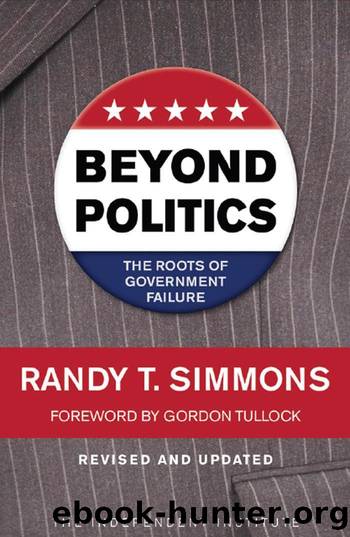Beyond Politics: The Roots of Government Failure by Randy T. Simmons

Author:Randy T. Simmons [Simmons, Randy T.]
Language: eng
Format: epub
Publisher: Independent Publishers Group
Published: 0101-01-01T00:00:00+00:00
The Common Law
The Anglo-Saxon world has been guided for centuries by a traditional, unwritten law, known as the common law. This body of law is based on custom, usage, and precedent. Blackstone’s 1769 Commentaries on the Laws of England was the basic source book for American lawyers and even for literate cowboys according to novelist Louis L’Amour.
The common law performs the role of expert witness in the court as it guides judges about how similar cases were decided in the past. Judges do not really know all the circumstances of past cases, just the general rules that have survived through centuries of trial and error. It may even be possible to consider the common law to be the law’s analogue to prices. Prices are condensed information about scarcity, values, and substitutes. The common law is condensed information about cases, incentives, and outcomes.
Not only is the common law condensed information, but also it promotes economic efficiency. The continual interaction between judicial actors, lawyers, and litigants has produced effective and efficient rules. The current legal rules regarding contract, property, and tort are the result of that interaction through time. Inefficient rules were dropped as litigants fought against them or found ways around them. According to this perspective, it is as if the market has produced the efficient rules that define it. This is indeed the case described in the textbooks of Posner (2007) and Cooter and Ulen (2007).
Efficient rules emerging through time is an example of what Hayek called “spontaneous order” (see, for example, The Fatal Conceit, University of Chicago Press, 1991). He meant that no one is in charge, that the order we see around us is spontaneous and organic rather than planned and controlled. A better term might be the one economist Russell Roberts uses, “emergent order.” Spontaneous suggests sudden, while emergent suggests the kind of process Posner and Cooter and Ulen describe.
Download
This site does not store any files on its server. We only index and link to content provided by other sites. Please contact the content providers to delete copyright contents if any and email us, we'll remove relevant links or contents immediately.
| Elections & Political Process | Ideologies & Doctrines |
| International & World Politics | Political Science |
| Public Affairs & Policy | Specific Topics |
| United States |
The Secret History by Donna Tartt(19092)
The Social Justice Warrior Handbook by Lisa De Pasquale(12191)
Thirteen Reasons Why by Jay Asher(8912)
This Is How You Lose Her by Junot Diaz(6889)
Weapons of Math Destruction by Cathy O'Neil(6281)
Zero to One by Peter Thiel(5802)
Beartown by Fredrik Backman(5756)
The Myth of the Strong Leader by Archie Brown(5509)
The Fire Next Time by James Baldwin(5448)
How Democracies Die by Steven Levitsky & Daniel Ziblatt(5219)
Promise Me, Dad by Joe Biden(5154)
Stone's Rules by Roger Stone(5088)
A Higher Loyalty: Truth, Lies, and Leadership by James Comey(4964)
100 Deadly Skills by Clint Emerson(4927)
Rise and Kill First by Ronen Bergman(4790)
Secrecy World by Jake Bernstein(4753)
The David Icke Guide to the Global Conspiracy (and how to end it) by David Icke(4720)
The Farm by Tom Rob Smith(4514)
The Doomsday Machine by Daniel Ellsberg(4490)
